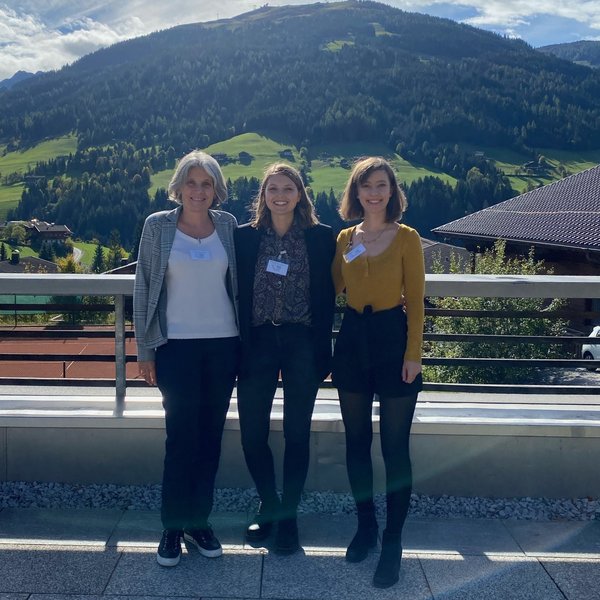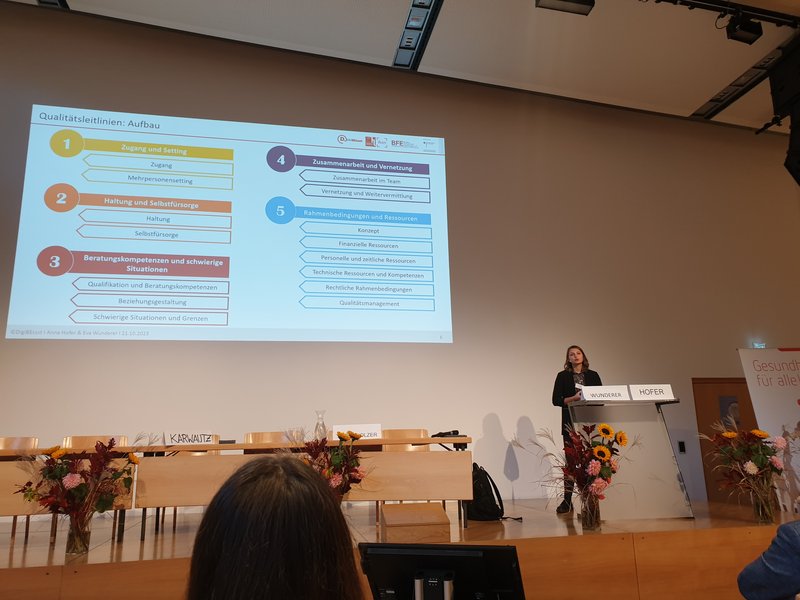Digital counseling services provide an easily accessible entry point to support for individuals with eating disorders and their families, and they have become indispensable, especially since the COVID-19 pandemic. But what defines the professionalism of a digital service? What should professionals and organizations consider? Guidance for professionals and those seeking help is provided by a research project at Landshut University in cooperation with the Federal Association for Eating Disorders (BFE).
Based on comprehensive literature research and a mixed-methods design, which includes an online questionnaire and semi-structured interviews, quality guidelines are being developed. These guidelines offer insights and prompts for reflection in five central areas: "Access and Setting," "Attitude and Self-care," "Counseling Competencies and Challenging Situations," "Collaboration and Networking," and "Framework Conditions and Resources." The guidelines will be published as a brochure on the BFE e.V. website and the Federal Center for Health Education (BZgA) website by the end of the year and will be available for free download.
The research team provides initial insights into the quality guidelines at professional conferences. For example, in June, during the 12th Clinical Social Work Conference in Coburg, the project team presented results related to relationship building in the digital space, as "relationship building is essential in online counseling and a key success factor" (quote from an interviewed professional). At the BFE e.V.'s annual conference in September in Munich, this year's focus was on family members of individuals with eating disorders. Therefore, in addition to initial insights into the quality guidelines, results from interviews with family members were also presented. What are the arguments for and against online counseling from the perspective of family members? What, in their view, characterizes professional digital counseling? Cäcilia Hasenöhrl, a member of the research team, explores these questions in her master's thesis. In September, at the hybrid 16th Online Counseling Specialist Forum in Nuremberg, numerous professionals from both practice and academia came together. In a specialist presentation, Anna Hofer presented not only eating disorder-specific aspects but also standards that are applicable to a broader audience, as the guidelines will be relevant beyond the scope of eating disorders. At the joint congress of the German Obesity Society (DAG) and the German Society for Eating Disorders (DGESS) in Gera, the results were presented in the context of the symposium "New Participatory Approaches to Counseling and Treatment for Eating Disorders: Focusing on Affected Individuals and Their Families." A multiperspective approach involving affected individuals, family members, and professionals has been central to the project from the beginning. In October, the quality guidelines were also presented as part of a keynote and a workshop at the 30th International Congress on Eating Disorders in Alpbach, Austria.
Anna Hofer is a research associate and doctoral candidate in the project. In her collaborative doctoral research between the Technical University of Dresden (supervised by Prof. Dr. Stefan Ehrlich) and Landshut University (supervised by Prof. Dr. Eva Wunderer and Prof. Dr. Bettina Kühbeck), she explores the question of what defines professional digital counseling for eating disorders. Starting in December 2023, Anna Hofer's doctoral project will be supported by a three-year scholarship from the German National Academic Foundation, underscoring the high relevance of the research endeavor.
The project "Digital Counseling Services of Professional Eating Disorder Counseling Centers: Participatory Inventory, Evaluation, and Development of Quality Guidelines," abbreviated as "DigiBEssst," is a two-year collaborative project (December 1, 2021, to November 30, 2023) funded by the German Federal Ministry of Health (BMG). The project partners are Landshut University and its research institute "Social Change and Cohesion Research" (IKON), as well as the Federal Association for Eating Disorders (BFE) e.V. The project team consists of project leaders Prof. Dr. Eva Wunderer, Sigrid Borse, and Andreas Schnebel, along with project team members Anna Hofer, Kathrin Harrach, and Cäcilia Hasenöhrl. The layout of the guidelines is designed by graphic artist Sabine Dohme. Numerous other cooperation partners are also involved.
Contact:
digitaleberatung(at)haw-landshut.de.Photos: Landshut University


